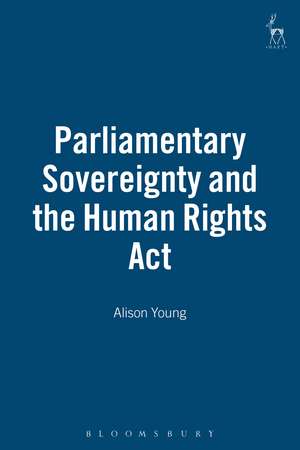Parliamentary Sovereignty and the Human Rights Act
Autor Alison L Youngen Limba Engleză Hardback – 4 dec 2008
Preț: 538.52 lei
Preț vechi: 626.19 lei
-14% Nou
Puncte Express: 808
Preț estimativ în valută:
103.06€ • 107.20$ • 85.08£
103.06€ • 107.20$ • 85.08£
Carte tipărită la comandă
Livrare economică 14-28 aprilie
Preluare comenzi: 021 569.72.76
Specificații
ISBN-13: 9781841138305
ISBN-10: 1841138304
Pagini: 200
Dimensiuni: 156 x 234 x 16 mm
Greutate: 0.44 kg
Editura: Bloomsbury Publishing
Colecția Hart Publishing
Locul publicării:London, United Kingdom
ISBN-10: 1841138304
Pagini: 200
Dimensiuni: 156 x 234 x 16 mm
Greutate: 0.44 kg
Editura: Bloomsbury Publishing
Colecția Hart Publishing
Locul publicării:London, United Kingdom
Caracteristici
Challenges the criticism that The Human Rights Act 1998 provides a weak protection of human rights.
Notă biografică
Alison Young is a Fellow and Tutor in Law at Hertford College, Oxford.
Cuprins
1 INTRODUCTION I. Defining Parliamentary Sovereignty: Dicey's Conception II. The Compatibility of the Human Rights Act 1998 with Dicey's Theory of Parliamentary Sovereignty III. Sovereignty Explored IV. In Defence of the Human Rights Act 1998 V. In Defence of Dicey 2 INTERPRETATION AND IMPLIED REPEAL I. Continuing Parliamentary Legislative Supremacy and the Doctrine of Implied Repeal: the Orthodox Account II. The Narrow Scope of Implied Repeal III. How to give Human Rights an 'Entrenchment Effect' IV. Conclusion 3 REDEFINITION AND THE RULE OF RECOGNITION I. Continuing and Self-embracing Parliamentary Legislative Supremacy II. Manner and Form and Redefinition III. Methods of Entrenchment IV. Conclusion 4 DEMOCRACY AND RIGHTS I. Dicey and Democracy II. Constitutional Rights III. Democratic Dialogue IV. Conclusion 5 DEMOCRATIC DIALOGUE AND THE HUMAN RIGHTS ACT 1998 I. Models of Dialogue II. Justification of Democratic Dialogue III. Justifications of the Human Rights Act 1998 IV. Dialogue and Institutional Competences V. Towards a Theory of Adjudication VI. Conclusion 6 A THEORY OF ADJUDICATION I. The Current Legal Test II. A New Theory of Adjudication III. Conclusion 7 CONCLUSION I. A Modest Defence of Continuing Parliamentary Legislative Supremacy II. Conclusion
Recenzii
...an academically valuable, as well as a very interesting book. It encouraged me to look at some topics in a new light and the focus on the significant role of interpretation, and on the potential of democratic dialogue, is welcome. ...the arguments and analysis in this work deserve to be read and widely so.
.the argument Young makes is a coherent and convincing one. Her discussion in chapter five of the sadly under-used theory of democratic dialogue in the context of the HRA is extremely compelling, with an admirable eye for the details of how dialogue would work.
...the book deserves reading (and re-reading) for the detailed analysis of parliamentary sovereignty.
Young's book provides an interesting account of what has been a significant point of constitutional interestThe book is very well written, providing a welcome and refreshing justification for Dicey's principle of parliamentary sovereignty in view of one of the most dramatic qualifications to have been introduced since the Parliament Act 1911.The book represents a well-written and well-argued account of the way in which parliamentary sovereignty related to the Human Rights Act 1998 and which makes a significant contribution to the academic field of constitutional law.
.the argument Young makes is a coherent and convincing one. Her discussion in chapter five of the sadly under-used theory of democratic dialogue in the context of the HRA is extremely compelling, with an admirable eye for the details of how dialogue would work.
...the book deserves reading (and re-reading) for the detailed analysis of parliamentary sovereignty.
Young's book provides an interesting account of what has been a significant point of constitutional interestThe book is very well written, providing a welcome and refreshing justification for Dicey's principle of parliamentary sovereignty in view of one of the most dramatic qualifications to have been introduced since the Parliament Act 1911.The book represents a well-written and well-argued account of the way in which parliamentary sovereignty related to the Human Rights Act 1998 and which makes a significant contribution to the academic field of constitutional law.
Descriere
This book argues that the principle of parliamentary legislative supremacy is sufficiently flexible to enable a stronger protection of human rights.
